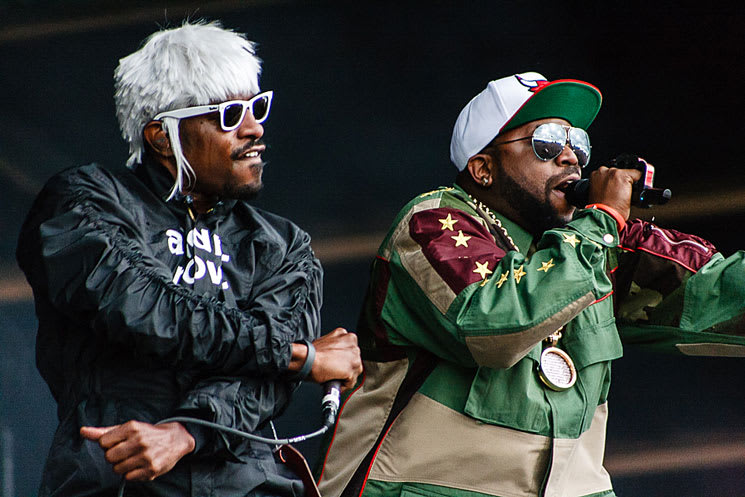A year marking the 50th anniversary of hip-hop is doubly commemorative for two of the genre's finest in Outkast, who are celebrating anniversary milestones for two of their most beloved albums in 1998's Aquemini and 2003's Speakerboxx/The Love Below — each of which have been treated to limited-edition coloured vinyl reissues to mark the occasion.
Just shy of a decade on from André 3000 and Big Boi's 2014 summer reunion tour, it feels unlikely that a full-blown Outkast reunion is in the cards. When not popping up to share the occasional guest verse, the former continues his acting pursuits while also bringing his latest musical pursuit to cities around the continent; the latest rumblings of a solo release having been denied. The latter, meanwhile, has been rocking mics from the Stampede to the Stanley Cup parade, pursuing dog breeding, owl handling, and stepping out solo with an LP of his own every so often.
With that in mind, we continue to marvel at their six studio albums together, each an astonishing feat of expression that has left listeners clamouring for more, and contemporaries playing catch-up.
Fans of Outkast understand that a certain futility that comes with attempting to rank their catalogue of albums: the group have produced no less than three undisputed classic full-lengths, and none of the six efforts are truly a misstep. Perhaps most impressively, the duo can never be accused of making the same album twice, continuously wielding their creativity both as collaborators and individuals to leave an indelible stamp on the genre.
In celebrating the anniversaries and accompanying vinyl reissues of both Aquemini and Speakerboxxx/The Love Below, we're counting down Outkast's albums from almost-as-great to greatest.
6. Idlewild (2006)
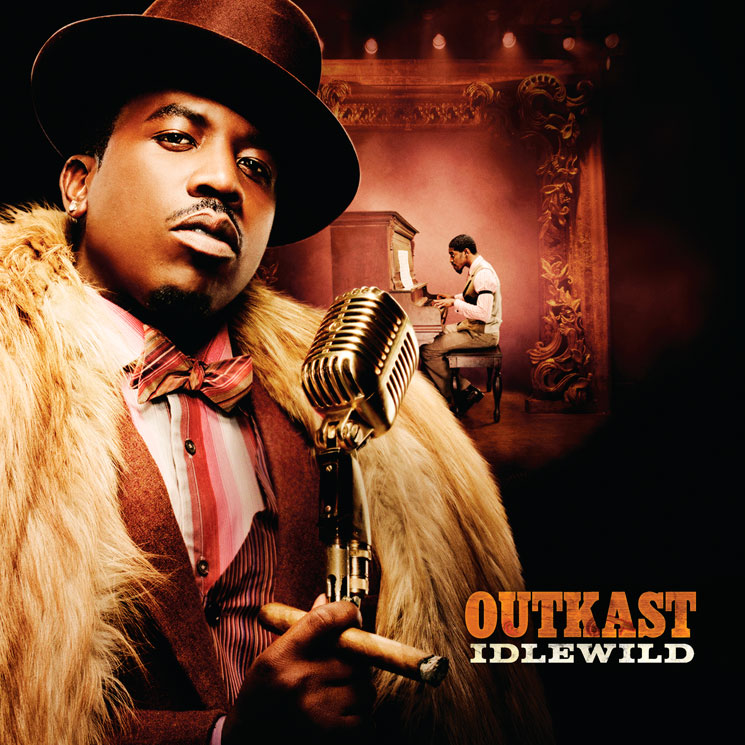
Outkast's sixth and final studio LP, Idlewild is by no means irredeemable, but will almost certainly continue living in the long shadows cast by its predecessors. A companion to the duo's musical film of the same name — centred on a Depression-era roadhouse in the titular, fictional Georgia town — the album sees Outkast hitch their soul and hip-hop strengths to styles of the period.
The results are curious, but ultimately for 'Kast completists, for every rap-rooted inclusion like "Mighty O," "The Train" and "Hollywood Divorce," there's "Idlewild Blue" skipping along to a 12-bar blues, "Makes No Sense at All" jumping into vocal-modulated action with its uptight jazz bass and piano, and "When I Look in Your Eyes" positioning André 3000 as the worldly crooner realizing there's no greater love than that before him at home.
If, after listening, you aren't moved to watch the film and see exactly how select songs fit into the film's narrative, listen closely for a pair of pre-fame features from Janelle Monáe — only four years out from walking the "Tightrope" with Big Boi in establishing her own imaginative musical universe.
5. Speakerboxxx/The Love Below (2003)
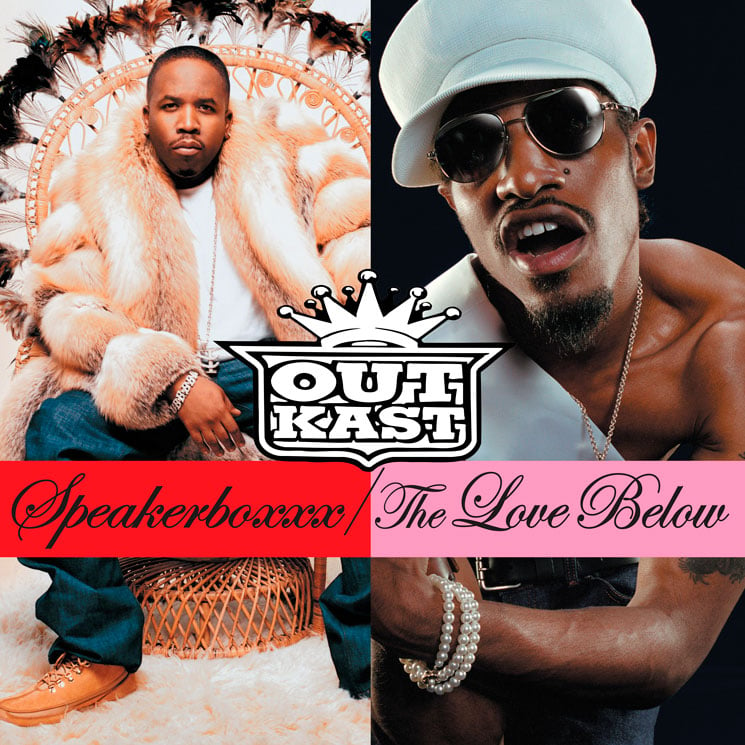
The double album that launched the duo to mainstream superstardom with hits like "The Way You Move," "Roses" and "Hey Ya!" — and recently became the best-selling rap album of all time — is often viewed as the beginning of the end for Outkast as a duo, given that Speakerboxxx/The Love Below brings together respective solo LPs from Big Boi and André 3000. They aren't fully apart from one another; André employs some certifiably stanky electronics in producing Speakerboxxx's "Ghetto Musick," "Church" and "Last Call," and Big Boi lays an effortlessly smooth verse on The Love Below's "Roses."
However, the undertaking remains the greatest look at the two halves that make the whole; Big Boi's Speakerboxxx booms with undeniable Southern feel and flavour, amplified by guest features from JAY-Z, Killer Mike, Lil Jon and Ludacris, while André's The Love Below finds his cinematic, conceptual storytelling centred on love brought to life with a sound palette blending pop, jazz and soul. Is there some bloat on either side? Certainly. But how many hip-hop double albums in recent memory — let alone LPs with 20 or more tracks — brim with such creativity?
4. Southernplayalisticadillacmuzik (1994)
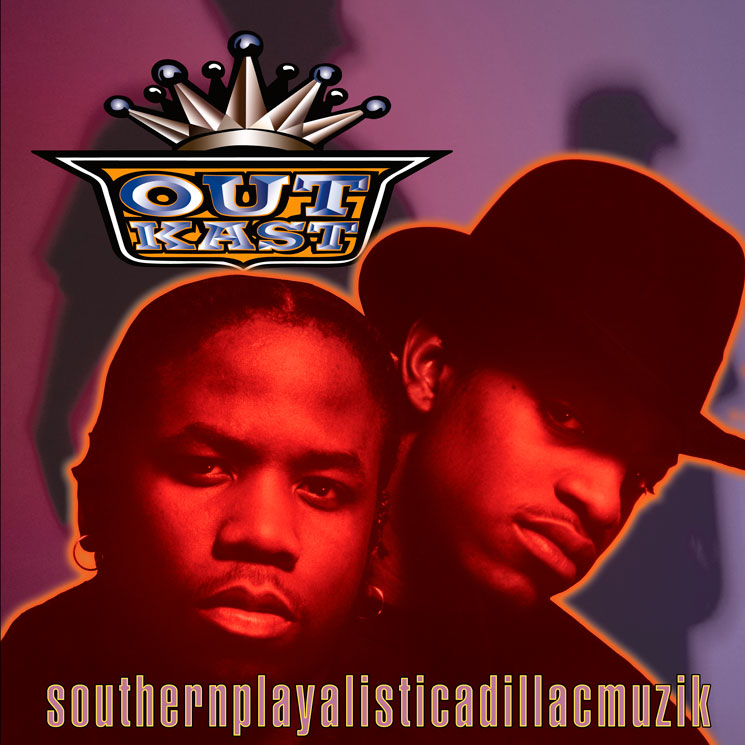
Not yet out of teenagehood, Big Boi and André went underground to the Dungeon — the basement recording studio-turned-Airbnb run by Rico Wade of burgeoning local production outfit Organized Noize — to shape their debut, lyrically illustrating life in Atlanta both as they knew it, and how they imagined it as Southern players behind the wheel of a Cadillac. That isn't to say they couldn't get "D.E.E.P.": on the hybrid analog-digital beats of Organized Noize, the duo turn in tales of street life's allure, a Southernplayalistic Christmas hymnal, smoking anthems juxtaposed by a directive to put down the joint in order to "Git Up, Git Out" and live life.
Foundational to hip-hop breaking out of the East Coast/West Coast binary ruling the period, Southernplayalisticadillacmuzik earned Outkast nominations for Rap Album of the Year and New Artist of the Year (Group) at the 1995 Source Awards. In winning the latter, the crowd at New York's Paramount Theater roundly booed the duo as they made their acceptance speeches, leaving a disconcerted André to decry "close-minded" detractors in concluding, "The South got somethin' to say" — a declaration that undoubtedly galvanized the region's scene, resulting in future decades of dominance.
3. Stankonia (2000)
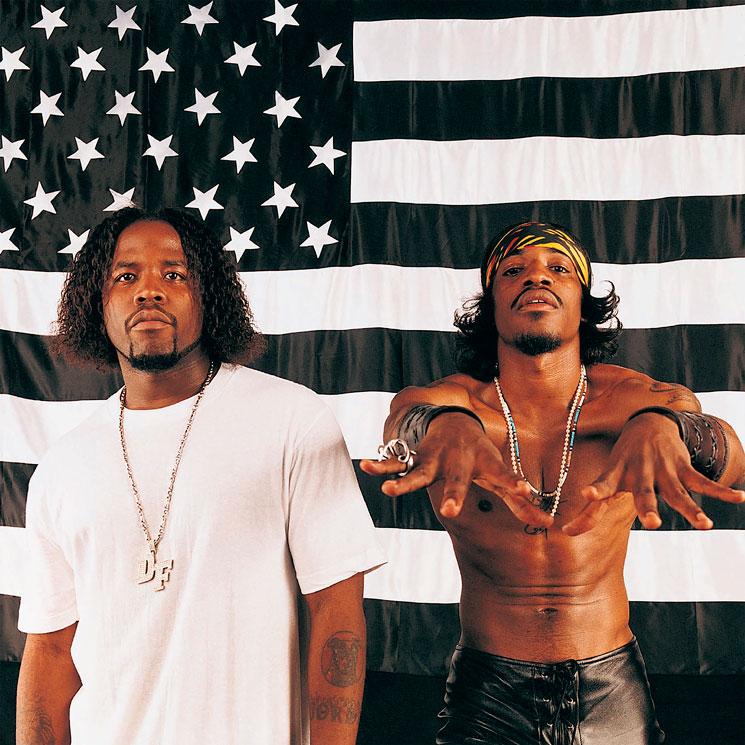
What's left for your group to accomplish after debuting with a regional smash that would become a pillar of Southern hip-hop, blasting off into the cosmos to chart new musical galaxies, then ascending to even greater heights of creative expression previously unseen? With Stankonia, Outkast rocketed back down to Earth, secured a recording studio all their own, plugged in and turned everything up to 11, opening their new millennium in explosive fashion.
From in front of the monochrome flag of their fictional nation — a place André 3000 described as one "where you can open yourself up and be free to express anything" — the duo met the changing moment with an energy altogether different than that of their first three albums, felt from the moment André hollers on the hook of "Gasoline Dreams," "Don't everybody like the smell of gasoline? / Well, burn motherfucker, burn American dreams."
While the sharpened pop prowess of "Ms. Jackson" and "So Fresh, So Clean" found the duo wider appeal, it's the liveliness of the playful percussion of "Humble Mumble," the cracking drums of "Snappin' & Trappin'" and "Xplosion," and the breakneck tempo of "B.O.B." that vaults Stankonia up this list. Outkast could have crafted another mellow, high-minded masterpiece, but that simply wouldn't do. The choir at that final song's end captures things expertly: "Power music, electric revival."
2. ATLiens (1996)
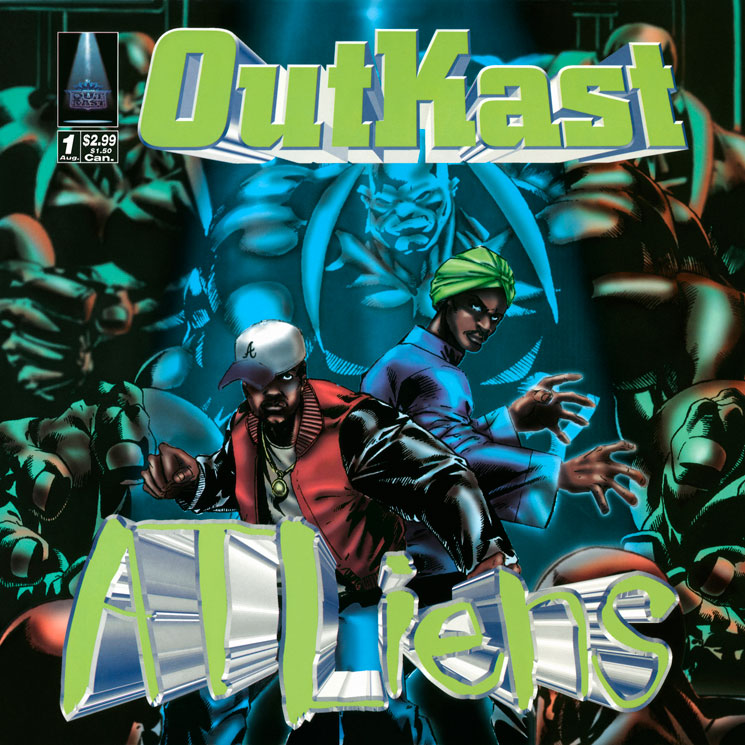
For all of Southernplayalisticadillacmuzik's success, the album still had its critics. Looking to level up on their sophomore release, it was as if Outkast took a page from Watchmen's weary Doctor Manhattan in feeling tired of Earth, its people, and the "tangle of their lives" as they looked out across the universe.
On ATLiens, the "Two Dope Boyz" cruise their Cadillac beyond the atmosphere to the stars, establishing themselves as pronounced stylists in pushing their beats and rhymes beyond what they previously accomplished on their home planet. Big Boi remaining "cooler than a polar bear's toenails," while a newly sober André 3000 stands ready to "get the signal clear as day," his pen now the weapon of choice.
Abandoning their player personas to float high above the Earth, the duo's spaceyspirituals grapple with otherness, growing older, living fast and navigating life and love in the wake of music industry success. Its production, a third of which sees Outkast creating their own instrumentals, communicates a darkness, vastness through drawing on dub and reggae in addition to the funk and soul of their debut. It's particularly felt in the sparseness of "Elevators (Me & You)," chronicling the ups and downs of fame in examining Outkast's own rise through rap's ranks, its muted melody guided by an reverberating snare. Here, André's final verse is unmissable, as he explains to a fan boy that his life of stardom isn't far removed from earthbound normality.
1. Aquemini (1998)
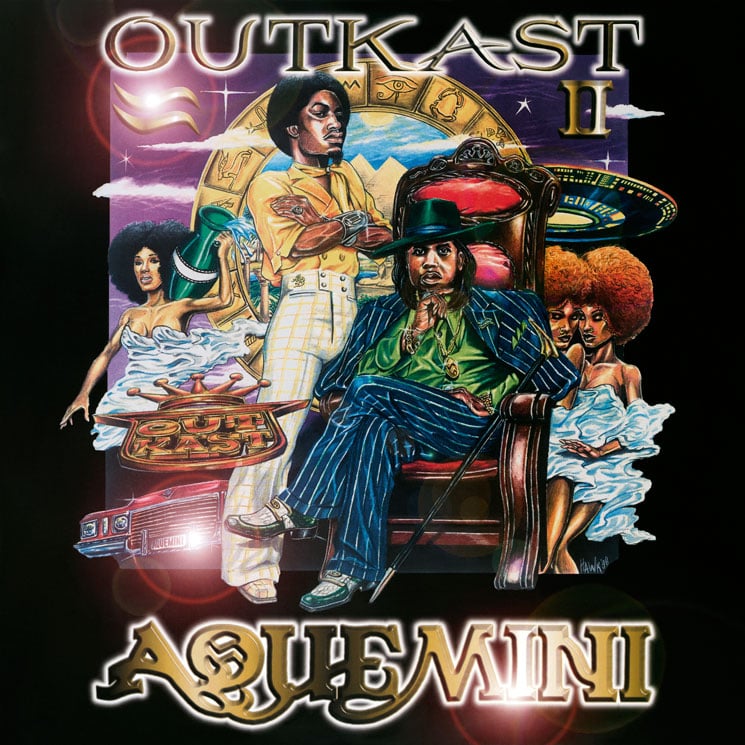
In a brief interlude toward the end of Aquemini's "Rosa Parks," Wu-Tang Clan's Raekwon throws a few of his patented knowledge darts to set up further roasting of regional rap boundaries alongside Outkast on "Skew It on the Bar-B," explaining, "You gotta come provocative n—. Shit gotta be spine-tingling, with mad styles and crazy dangerous, I mean, bust-ya-shit-open beats, you know what I mean?"
On what remains their crowning achievement, Big Boi and André are in no short supply of those elements; the player and the poet fusing their powers to form the 13th astrological sign, continuing to demonstrate eclecticism and uncompromising ambition in their music and lyrics. One gets the sense that Outkast reached a new creative apex from the smacking drums and orchestral flourishes of opener "Return of the 'G'," over which André's rapid fire delivery speaks to "time travelin', rhyme javelin, somethin' mind unravelin.'" There are songs of freedom from the ills of the world, and of the pitfalls of addiction. The harmonica breakdown in the bridge of "Rosa Parks" (who notably sued the duo over the song) and the reggae brass hook livening up "SpottieOttieDopaliscious" are some of the greatest instrumental moments in the Outkast catalogue. George Clinton appears on the mildly technophobic "Synthesizer" ("Virtual reality? Virtual bullshit!"), while Erykah Badu metes out tough industry truths on "Liberation": "All you wanna do is give the world your heart / Record label tried to make you compromise your art." Thankfully, that latter line wasn't the case here.
Aquemini remains one of the best albums — let alone hip-hop albums — ever made, and on the title track, it feels as if Big Boi and André understood that, with this statement, their own friendship and legacy as Outkast would endure beyond however many reunion tours or record reissues the future held for them: "Nothing is for sure, nothing is for certain / Nothing lasts forever, but until they close the curtain / It's him and I: Aquemini."
Just shy of a decade on from André 3000 and Big Boi's 2014 summer reunion tour, it feels unlikely that a full-blown Outkast reunion is in the cards. When not popping up to share the occasional guest verse, the former continues his acting pursuits while also bringing his latest musical pursuit to cities around the continent; the latest rumblings of a solo release having been denied. The latter, meanwhile, has been rocking mics from the Stampede to the Stanley Cup parade, pursuing dog breeding, owl handling, and stepping out solo with an LP of his own every so often.
With that in mind, we continue to marvel at their six studio albums together, each an astonishing feat of expression that has left listeners clamouring for more, and contemporaries playing catch-up.
Fans of Outkast understand that a certain futility that comes with attempting to rank their catalogue of albums: the group have produced no less than three undisputed classic full-lengths, and none of the six efforts are truly a misstep. Perhaps most impressively, the duo can never be accused of making the same album twice, continuously wielding their creativity both as collaborators and individuals to leave an indelible stamp on the genre.
In celebrating the anniversaries and accompanying vinyl reissues of both Aquemini and Speakerboxxx/The Love Below, we're counting down Outkast's albums from almost-as-great to greatest.
6. Idlewild (2006)

Outkast's sixth and final studio LP, Idlewild is by no means irredeemable, but will almost certainly continue living in the long shadows cast by its predecessors. A companion to the duo's musical film of the same name — centred on a Depression-era roadhouse in the titular, fictional Georgia town — the album sees Outkast hitch their soul and hip-hop strengths to styles of the period.
The results are curious, but ultimately for 'Kast completists, for every rap-rooted inclusion like "Mighty O," "The Train" and "Hollywood Divorce," there's "Idlewild Blue" skipping along to a 12-bar blues, "Makes No Sense at All" jumping into vocal-modulated action with its uptight jazz bass and piano, and "When I Look in Your Eyes" positioning André 3000 as the worldly crooner realizing there's no greater love than that before him at home.
If, after listening, you aren't moved to watch the film and see exactly how select songs fit into the film's narrative, listen closely for a pair of pre-fame features from Janelle Monáe — only four years out from walking the "Tightrope" with Big Boi in establishing her own imaginative musical universe.
5. Speakerboxxx/The Love Below (2003)

The double album that launched the duo to mainstream superstardom with hits like "The Way You Move," "Roses" and "Hey Ya!" — and recently became the best-selling rap album of all time — is often viewed as the beginning of the end for Outkast as a duo, given that Speakerboxxx/The Love Below brings together respective solo LPs from Big Boi and André 3000. They aren't fully apart from one another; André employs some certifiably stanky electronics in producing Speakerboxxx's "Ghetto Musick," "Church" and "Last Call," and Big Boi lays an effortlessly smooth verse on The Love Below's "Roses."
However, the undertaking remains the greatest look at the two halves that make the whole; Big Boi's Speakerboxxx booms with undeniable Southern feel and flavour, amplified by guest features from JAY-Z, Killer Mike, Lil Jon and Ludacris, while André's The Love Below finds his cinematic, conceptual storytelling centred on love brought to life with a sound palette blending pop, jazz and soul. Is there some bloat on either side? Certainly. But how many hip-hop double albums in recent memory — let alone LPs with 20 or more tracks — brim with such creativity?
4. Southernplayalisticadillacmuzik (1994)

Not yet out of teenagehood, Big Boi and André went underground to the Dungeon — the basement recording studio-turned-Airbnb run by Rico Wade of burgeoning local production outfit Organized Noize — to shape their debut, lyrically illustrating life in Atlanta both as they knew it, and how they imagined it as Southern players behind the wheel of a Cadillac. That isn't to say they couldn't get "D.E.E.P.": on the hybrid analog-digital beats of Organized Noize, the duo turn in tales of street life's allure, a Southernplayalistic Christmas hymnal, smoking anthems juxtaposed by a directive to put down the joint in order to "Git Up, Git Out" and live life.
Foundational to hip-hop breaking out of the East Coast/West Coast binary ruling the period, Southernplayalisticadillacmuzik earned Outkast nominations for Rap Album of the Year and New Artist of the Year (Group) at the 1995 Source Awards. In winning the latter, the crowd at New York's Paramount Theater roundly booed the duo as they made their acceptance speeches, leaving a disconcerted André to decry "close-minded" detractors in concluding, "The South got somethin' to say" — a declaration that undoubtedly galvanized the region's scene, resulting in future decades of dominance.
3. Stankonia (2000)

What's left for your group to accomplish after debuting with a regional smash that would become a pillar of Southern hip-hop, blasting off into the cosmos to chart new musical galaxies, then ascending to even greater heights of creative expression previously unseen? With Stankonia, Outkast rocketed back down to Earth, secured a recording studio all their own, plugged in and turned everything up to 11, opening their new millennium in explosive fashion.
From in front of the monochrome flag of their fictional nation — a place André 3000 described as one "where you can open yourself up and be free to express anything" — the duo met the changing moment with an energy altogether different than that of their first three albums, felt from the moment André hollers on the hook of "Gasoline Dreams," "Don't everybody like the smell of gasoline? / Well, burn motherfucker, burn American dreams."
While the sharpened pop prowess of "Ms. Jackson" and "So Fresh, So Clean" found the duo wider appeal, it's the liveliness of the playful percussion of "Humble Mumble," the cracking drums of "Snappin' & Trappin'" and "Xplosion," and the breakneck tempo of "B.O.B." that vaults Stankonia up this list. Outkast could have crafted another mellow, high-minded masterpiece, but that simply wouldn't do. The choir at that final song's end captures things expertly: "Power music, electric revival."
2. ATLiens (1996)

For all of Southernplayalisticadillacmuzik's success, the album still had its critics. Looking to level up on their sophomore release, it was as if Outkast took a page from Watchmen's weary Doctor Manhattan in feeling tired of Earth, its people, and the "tangle of their lives" as they looked out across the universe.
On ATLiens, the "Two Dope Boyz" cruise their Cadillac beyond the atmosphere to the stars, establishing themselves as pronounced stylists in pushing their beats and rhymes beyond what they previously accomplished on their home planet. Big Boi remaining "cooler than a polar bear's toenails," while a newly sober André 3000 stands ready to "get the signal clear as day," his pen now the weapon of choice.
Abandoning their player personas to float high above the Earth, the duo's spaceyspirituals grapple with otherness, growing older, living fast and navigating life and love in the wake of music industry success. Its production, a third of which sees Outkast creating their own instrumentals, communicates a darkness, vastness through drawing on dub and reggae in addition to the funk and soul of their debut. It's particularly felt in the sparseness of "Elevators (Me & You)," chronicling the ups and downs of fame in examining Outkast's own rise through rap's ranks, its muted melody guided by an reverberating snare. Here, André's final verse is unmissable, as he explains to a fan boy that his life of stardom isn't far removed from earthbound normality.
1. Aquemini (1998)

In a brief interlude toward the end of Aquemini's "Rosa Parks," Wu-Tang Clan's Raekwon throws a few of his patented knowledge darts to set up further roasting of regional rap boundaries alongside Outkast on "Skew It on the Bar-B," explaining, "You gotta come provocative n—. Shit gotta be spine-tingling, with mad styles and crazy dangerous, I mean, bust-ya-shit-open beats, you know what I mean?"
On what remains their crowning achievement, Big Boi and André are in no short supply of those elements; the player and the poet fusing their powers to form the 13th astrological sign, continuing to demonstrate eclecticism and uncompromising ambition in their music and lyrics. One gets the sense that Outkast reached a new creative apex from the smacking drums and orchestral flourishes of opener "Return of the 'G'," over which André's rapid fire delivery speaks to "time travelin', rhyme javelin, somethin' mind unravelin.'" There are songs of freedom from the ills of the world, and of the pitfalls of addiction. The harmonica breakdown in the bridge of "Rosa Parks" (who notably sued the duo over the song) and the reggae brass hook livening up "SpottieOttieDopaliscious" are some of the greatest instrumental moments in the Outkast catalogue. George Clinton appears on the mildly technophobic "Synthesizer" ("Virtual reality? Virtual bullshit!"), while Erykah Badu metes out tough industry truths on "Liberation": "All you wanna do is give the world your heart / Record label tried to make you compromise your art." Thankfully, that latter line wasn't the case here.
Aquemini remains one of the best albums — let alone hip-hop albums — ever made, and on the title track, it feels as if Big Boi and André understood that, with this statement, their own friendship and legacy as Outkast would endure beyond however many reunion tours or record reissues the future held for them: "Nothing is for sure, nothing is for certain / Nothing lasts forever, but until they close the curtain / It's him and I: Aquemini."
